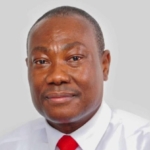
The Association of Mining Communities of Ghana (AMCOG) has hailed the tenure of outgoing Minerals Commission Chief Executive Officer, Martin Ayisi, describing his leadership as transformative and impactful, particularly in the fight against illegal mining, also known as galamsey.
In a press statement signed by AMCOG Chairman Nana Kwabena Adjei, the group commended Mr. Ayisi for reshaping the Commission into a service-oriented institution that directly engages mining communities.
“When Martin Ayisi took over, the Commission was seen as a bureaucratic, distant body. Today, it is an institution of service, with offices in our communities, inspectors who understand our needs, and leaders who listen. He changed the Commission forever,” the statement read.
Improving Infrastructure in Mining Areas
The group highlighted the construction of modern regional and district offices as one of Mr. Ayisi’s greatest achievements.
“For decades, branch offices were left in a state of neglect, with dilapidated buildings, poor logistics, and inadequate working environments,” the statement noted.
“Today, the story is different. Under Mr. Ayisi’s leadership, over 10 ultramodern regional and district offices have been constructed or rehabilitated, creating an entirely new image for the Minerals Commission.”
Until recent years, offices in key mining hubs such as Dunkwa, Bole, Konongo, Akim Oda, Bibiani, Tarkwa, and Kumasi were in deplorable condition, but have now been rebuilt into modern facilities.
Human Resource Development and Reforms
Mr. Ayisi also prioritised staff development, with over 50 technical officers receiving international training in mining regulation, geotechnical oversight, and community engagement.
“These men and women are the backbone of the new Minerals Commission,” said AMCOG Secretary, Samuel Kusi. “When they came back, they brought international standards into our local mining context.”
Under his leadership, the Commission introduced reforms to formalise the small-scale mining sector. Initiatives such as the Cooperative Mining Framework, District Mining Committees, and the Ghana Landscape Restoration Project provided artisanal miners with structured, legal avenues to operate.
The Commission also pushed for amendments to the Minerals and Mining Act (Act 703) to strengthen accountability, close loopholes, and ensure host communities benefit more equitably from mining activities.
Fighting Galamsey and Promoting Sustainability
Mr. Ayisi’s tenure saw a renewed focus on tackling illegal mining and promoting sustainability. Efforts were made to reclaim degraded lands, integrate responsible mining practices, and empower marginalised groups, including women and youth, through skills training and access to opportunities.
“Export revenues from the ASM [artisanal and small-scale mining] sector under his leadership surpassed USD 10 billion in 2024, while employment opportunities expanded to over one million Ghanaians,” the statement added.
While acknowledging that challenges remain, AMCOG praised Mr. Ayisi for laying a strong foundation to combat galamsey and improve governance in Ghana’s mining sector.
